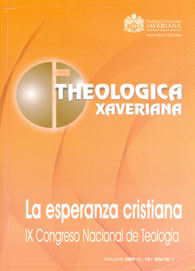Abstract
De cara a los desafíos que se presentan en el recién comenzado siglo XXI, el autor ofrece algunas perspectivas para la Iglesia, su pastoral y su teología. Dichas perspectivas se plantean teniendo como telón de fondo la urgencia de que la Iglesia, frente a un mundo excluyente e insolidario, se presente como “casa y escuela de la comunión” donde no se excluye a nadie y donde la solidaridad con todos, sobre todo con los excluidos, hace que ellos se sientan “como en su casa”.CONFERENCIA EPISCOPAL LATINOAMERICANA, Documento de Santo Domingo.
CONSEJO EPISCOPAL LATINOAMERICANO. Globalización y nueva evangelización en América Latina y el Caribe. Reflexiones del Celam, 1999-2003, Bogotá, 2003.
DUPUIS, J. Hacia una teología cristiana del pluralismo religioso, Sal Terrae,
Santander, 2002a.
DUPUIS, J. El cristianismo y las religiones. Del desencuentro al diálogo, Sal
Terrae, Santander, 2002.
GEFFRÉ, C. “Le pluralisme religieux et I’indifférentisme, ou le vrai défi de la
théologie chrétienne”, en Revue théologique de Louvain 31, 2000.
JUAN PABLO II, Carta apostólica Novo millennio ineunte.
JUAN PABLO II, Exhortación apostólica Ecclesia in America.
LAGUNA, JOSÉ, “¿De la liberación a la inclusión? Qué teología para el cuarto mundo”, en Cuadernos Cristianismo y justicia, 127, septiembre de 2004.
This journal is registered under a Creative Commons Attribution 4.0 International Public License. Thus, this work may be reproduced, distributed, and publicly shared in digital format, as long as the names of the authors and Pontificia Universidad Javeriana are acknowledged. Others are allowed to quote, adapt, transform, auto-archive, republish, and create based on this material, for any purpose (even commercial ones), provided the authorship is duly acknowledged, a link to the original work is provided, and it is specified if changes have been made. Pontificia Universidad Javeriana does not hold the rights of published works and the authors are solely responsible for the contents of their works; they keep the moral, intellectual, privacy, and publicity rights.
Approving the intervention of the work (review, copy-editing, translation, layout) and the following outreach, are granted through an use license and not through an assignment of rights. This means the journal and Pontificia Universidad Javeriana cannot be held responsible for any ethical malpractice by the authors. As a consequence of the protection granted by the use license, the journal is not required to publish recantations or modify information already published, unless the errata stems from the editorial management process. Publishing contents in this journal does not generate royalties for contributors.


